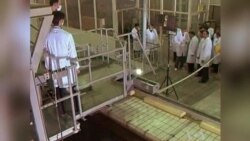The five permanent members of the United Nations Security Council, plus Germany, are heading back Friday to Almaty, Kazakhstan, for talks with Iran over its nuclear program.
As the West and Israel say Iran is creeping closer to being able to produce a nuclear weapon, Western officials hope Tehran will react positively to their latest offer.
The question -- as negotiators prepare to face off again this week -- just how much is Iran willing to give?
"I remain always cautiously optimistic. But I am also very clear that it is very important that we do get a response [from Iran],'' said European Union foreign policy chief Catherine Ashton.
During the first round of talks in Almaty, in February, the so-called P5+1 offered the possibility of easing some international sanctions. In return, Iran would have to suspend enrichment of high-grade uranium which could be used in an atomic bomb.
"They have an ability to rejoin the community of nations, to get out from under this isolation," said U.S. Secretary of State John Kerry:
“Let’s hope that they put something on the table that is more realistic than the plan that they submitted last summer when they asked for everything and offered very, very little,” said analyst Mark Fitzpatrick, of the International Institute for Strategic Studies, who notes that the Iranians have balked before.
Western officials have been quick to make clear Tehran has only so much room to maneuver -- an idea reaffirmed by U.S. President Barack Obama.
"All options are on the table. We will do what is necessary to prevent Iran from getting the world's worst weapons," Obama said.
At last month's meeting of the International Atomic Energy Agency, Iranian Ambassador Ali Asghar Soltanieh signaled Tehran may only be willing to go so far.
"We are committed to continue our dialogue with the IAEA and this commitment has been unwavering, but at the same time we cannot give a blank check for our national security. No country would give a blank check," Soltanieh said.
Also potentially affecting the upcoming talks -- and Iran's strategy -- is the renewed saber-rattling from North Korea, threatening to "settle accounts" with the U.S.
“Just because it’s a reminder that the Iranians may be disagreeable in various aspects of their regime, they may be very difficult negotiators but in comparison with the North Koreans this is a very rational and manageable process,” said Greg Thielmann, who is with the Arms Control Association.
Many analysts say the most that can be hoped for with Iran is yet more talks, though that will likely have to wait until after Iran's June elections.
As the West and Israel say Iran is creeping closer to being able to produce a nuclear weapon, Western officials hope Tehran will react positively to their latest offer.
The question -- as negotiators prepare to face off again this week -- just how much is Iran willing to give?
"I remain always cautiously optimistic. But I am also very clear that it is very important that we do get a response [from Iran],'' said European Union foreign policy chief Catherine Ashton.
During the first round of talks in Almaty, in February, the so-called P5+1 offered the possibility of easing some international sanctions. In return, Iran would have to suspend enrichment of high-grade uranium which could be used in an atomic bomb.
"They have an ability to rejoin the community of nations, to get out from under this isolation," said U.S. Secretary of State John Kerry:
“Let’s hope that they put something on the table that is more realistic than the plan that they submitted last summer when they asked for everything and offered very, very little,” said analyst Mark Fitzpatrick, of the International Institute for Strategic Studies, who notes that the Iranians have balked before.
Western officials have been quick to make clear Tehran has only so much room to maneuver -- an idea reaffirmed by U.S. President Barack Obama.
"All options are on the table. We will do what is necessary to prevent Iran from getting the world's worst weapons," Obama said.
At last month's meeting of the International Atomic Energy Agency, Iranian Ambassador Ali Asghar Soltanieh signaled Tehran may only be willing to go so far.
"We are committed to continue our dialogue with the IAEA and this commitment has been unwavering, but at the same time we cannot give a blank check for our national security. No country would give a blank check," Soltanieh said.
Also potentially affecting the upcoming talks -- and Iran's strategy -- is the renewed saber-rattling from North Korea, threatening to "settle accounts" with the U.S.
“Just because it’s a reminder that the Iranians may be disagreeable in various aspects of their regime, they may be very difficult negotiators but in comparison with the North Koreans this is a very rational and manageable process,” said Greg Thielmann, who is with the Arms Control Association.
Many analysts say the most that can be hoped for with Iran is yet more talks, though that will likely have to wait until after Iran's June elections.










